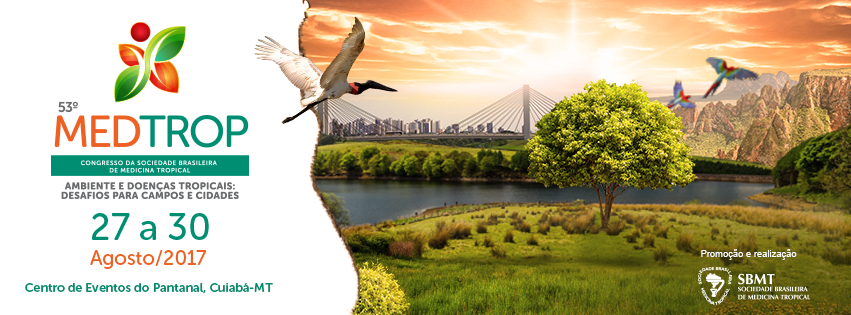
53rd Medtrop program focuses on Brazilian endemic diseases and relevant themes in national and international scenarios
Arboviral diseases, AIDS, syphilis, leishmaniasis, Chagas, leprosy, malaria and viral hepatitis are also among the programs highlights
09/05/2017
We want those people affected by the so-called neglected diseases to speak out in scientific discussion scenarios during the MedTrop
The organization of the 53rd Congress of the Brazilian Society of Tropical Medicine (MedTrop), to be held in Cuiabá, from August 27 to 30, is at full throttle to welcome all guests and participants. According to the Chair of this edition, Dr. Marcia Hueb, the program is in the final stages of planning and carefully prepared to focus Brazilian endemic diseases from the most diverse regions and realities, including themes that currently require major attention in the national and international scenarios.
Arboviral diseases will be in the programs spotlight. Diseases caused by different viruses that fit in this category have always been in Brazilian urban and wild contexts; dengue, for example, is an urban disease of large proportions, a constant challenge in assistance, control and prevention, currently deserves a greater focus among researchers dedicated to producing effective vaccines and who study the best schemes; yellow fever, a vaccine-preventable disease previously restricted to wild environments – currently threatening to strike urban environments – that still is a great cause for morbimortality in Brazil. Zika and Chikungunya, representing the new face of urban arboviral diseases, with so much to be learned about its pathogenic potentials and early and late consequences to the population, stresses the Chair while ensuring MedTrop Cuiabá will bring the very best from scientific fields approaching these diseases, with the presence of renowned researchers and their latest papers.
Aids, another very important theme that always surprises with different epidemiological realities, depending on the historical moment and environment it is involved, will also have a special place, so people can have a better understanding of what we know so far about treatment and prevention, as well as its dark side which is the impact it has over other endemic diseases in co-infection situations. Important names of the scientific community will be present along with members of institutions for public health policies. This is always an important aspect in our Congresses: the interaction of science with the necessary decisions for health policies, she specifies. Within the AIDS/STD, syphilis is back as an extremely important theme due to the increasing incidence of vertical transmission cases; since it is a treatable and curable disease, health actions must aim both in seeking flaws and in solutions to reduce or even eradicate the infection. This will be one of the themes to be discussed.
Neglected diseases as Chagas and leishmaniasis will have their own space, designed to follow the dimension of the problem they represent. The Applied Research Meeting is also in the MedTrop program, and the guests will join the entire event, but with a special program with workshops, round tables and technical meetings with the presence of renowned scientists, epidemiologists and members of several control agencies involved with these diseases. The silence of people affected by these diseases and many others so-called neglected will find its tone in one of the few scientific discussion scenarios, and MedTrop intends to be one of them, she said.
Leprosy, a world-wide public health issue, with concerning numbers in Brazil, and in Mato gross, alarming numbers, putting the State in first place in the Country in number of cases, will find in this MedTrop edition the time and special attention it deserves, with courses of clinic handling for health professionals, besides round tables approaching from the epidemiology to difficulties diagnosing and treating. Other diseases that find little space for discussion as brucellosis, Hantavirus diseases, schistosomiasis will be represented in Tables for theme updates, reveals Dr. Marcia.
On the other hand, malaria, which is among the tropical diseases with greater world relevance and is always a challenge in our reality, will have a pre-congress course for diagnostic and treatment training, besides round tables to discuss the current aspects for scientific update.
Viral hepatitis, in all its dimensions reaching from epidemiological aspects that make our broad Brazilian scenario, to practical aspects of therapy approach, will be very well represented with renowned local and national experts, finishes the Chair of the 53rd MedTrop.…










